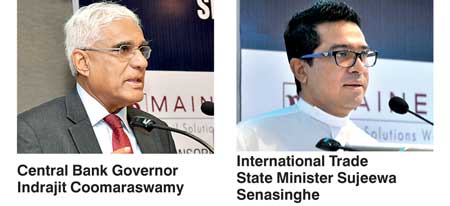Friday Feb 27, 2026
Friday Feb 27, 2026
Tuesday, 3 October 2017 00:00 - - {{hitsCtrl.values.hits}}
By Charumini de Silva
In a fresh bid to enhance the supply of trade finance to SMEs, Central Bank Governor Dr. Indrajit Coomaraswamy said the Government was planning to set up a development banking mechanism, which will have the capacity to mobilise long-term funding from multilateral sources under the sovereign risk.
“The idea now is for the Government to set up a development banking mechanism that will have the capacity to mobilise long-term funding from multinationals through the issuances of bonds, debentures and so on under the sovereign risk then to make this money available through the banking networks to commercial enterprises,” he said at a forum in Colombo yesterday.
Addressing the ‘Sri Lanka and GSP+: Ensuring Sustainable Supply Chains’, organised by the European Chamber of Commerce of Sri Lanka (ECCSL), in partnership with the Foreign Trade Association (FTA) and the International  Labuor Organization (ILO), he pointed out that it was a key mechanism for transmitting the benefits of growth to ensure an inclusive development process, the social market economy the Government was committed to.
Labuor Organization (ILO), he pointed out that it was a key mechanism for transmitting the benefits of growth to ensure an inclusive development process, the social market economy the Government was committed to.
“Globally, half of the SME applications to trade finance are turned down. However, in the case of multinationals, the rejection rate is only 7%. So there is big asymmetry in terms of access SMEs have in accessing trade finance. That is something which clearly needs to be addressed,” he stressed.
Noting that SMES were a leading driver of trade and employment in an economy, Dr. Coomaraswamy asserted that this new development banking mechanism would also include a trade financing window.
He emphasised that out of the massive data collected by the Central Bank on trade financing in Sri Lanka, the evidence is that much of it is directed toward relatively unproductive sectors.
“Much of this finance is not for the forward-looking, export-oriented new sectors in the trading environment that we would want to be supported.”
In addition, he acknowledged there was a need to ensure that the loan portfolio of commercial banks was increased and diversified by extending loans to other subsectors that have the potential to grow in the future.
Dr. Coomaraswamy highlighted the maturity mismatch as the key difficulty the commercial banks have in undertaking development financing.
According to him, the majority of commercial banks tend to raise their money for one year or less in fixed deposits, a maximum of a couple of years, whereas the requirement in the SME sector is for over five to seven years.
The Governor focused his remarks on three issues, saying: “One is before we talk of trade financing opportunities we need to boost trade. Secondly, before we talk about trade financing for SMEs we need to ask ourselves whether we can do better to promote them. Finally, before we talk about financing a supply chain, we need to penetrate the supply chains.”
He said it is disturbing that the tradable goods sector in Sri Lanka declined from about 80% in the early 2000s to about 45% now. “We have a small open economy, which is clearly not a healthy trend. If you are a small open economy, which had a surge in foreign commercial borrowings without a growth in exports, it means you are really asking for trouble. The only way we can get out of it is by increasing our export earnings.”
Dr. Coomaraswamy expressed confidence that they can manage a small open economy, which had a surge in foreign commercial borrowings situation, provided that the Government stuck to its fiscal consolidation trajectory.
If Sri Lanka was to attract investment and increase trade, he said the demand for trade financing was going to increase quite dramatically and stressed the challenge was to get SMEs into this narrative.
Noting that Government institutes were presiding over a number of initiatives, he emphasised the need to execute them effectively to bolster trade and particularly export expansion.
The real effective exchange rate being overvalued for many years and a significant increase in para-tariffs were highlighted as the main factors for the decline in the tradable sector.
Despite the Government’s attempts to promote SME trade finance initiatives many times, he said it failed because they did not completely focus on marketing and promoting. “If you clear the marketing channel, the other things fall into place; that’s where the supply story comes in. If you look at the demand side of the trade finance in Sri Lanka you can see a significant increase in the pipeline. We need to find ways and means to link up our SMEs to these supply chains directly or indirectly.”
He noted that the Government’s commitment towards new comprehensive partnership agreements with China, India and Singapore as well as attempts to invigorate free trade agreements with Pakistan would perhaps have the greatest potential to truly shift the needle in terms of exports.
“If the Government’s trade agreements are successfully concluded, Sri Lanka will have preferential access to close to four billion with China, India and the EU. This can be a key differentiator.”
International Trade State Minister Sujeewa Senasinghe said Sri Lanka has achieved a lot in terms of labour rights, human rights, protecting the environment and good governance in regaining GSP+ and retaining it.
Pointing out that GSP+ was not going to be there eternally, he called on enterprises to take risks and be more adventurous to gain the best out of the trade facility. “It is important that we move into new industries away from apparel sector.”
He elaborated on the Government’s commitment to retain GSP+.
The core objective of the forum is to underline the importance attached to sustainable supply chains in pursuing opportunities available through the GSP+ facility.
-Pix by Lasantha Kumara